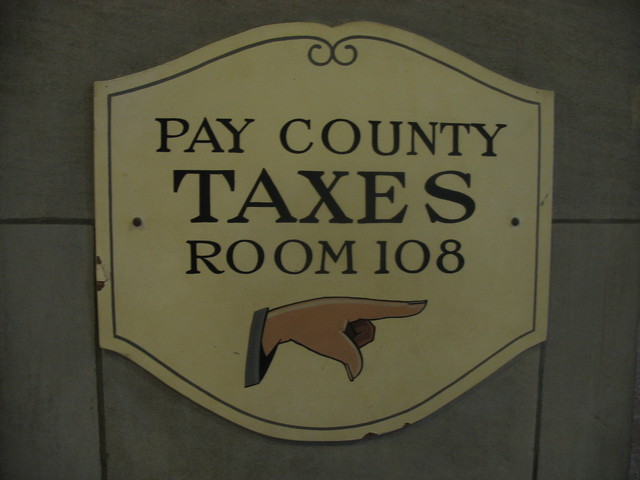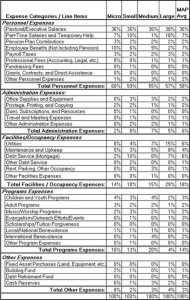Call me disillusioned, or even bitter if you must, but I firmly believe there are a lot of things churches in the U.S. have gotten wrong throughout the years. One of those things is the tax-exempt status of the church. It may not be a hot-button issue, or something many people have even thought about, but it does bother me for a number of reasons. Churches are, generally, exempt from property, income, and sales taxes. Donations to churches are also tax deductible.

Let’s pretend for a moment that Jesus didn’t pay taxes and didn’t tell us to also pay taxes (which should be reason enough for churches to pay taxes). I want to look at four of the main arguments to continue the tax-exempt status of churches and break them down.
1. Taxing churches keeps a separation of church and state
I can see where you would get this idea. However, it’s actually the contrary. Did you know that the first time churches were tax exempt only happened because Emporor Constantine converted to Christianity? Tax exemption started only when a leading government official became a Christian. That’s not very separate. Furthermore, by treating churches differently than other businesses (we’ll get to why I call them that later on), the government is giving preferential treatment to them. The government is subsidizing religion through these exemptions. This is unconstitutional.
2. Churches have been tax-exempt for over 200 years
Just because it has been done, doesn’t mean it’s how it should be done. Also, we’ve seen a large scale shift in the function and roles of Churches in society in the last 200 years, and thus, this should be looked at anew. We also must consider the new economic landscape in which we stand, where $300-$500 billion of untaxed property owned by churches could do a lot of good in a lot of places. Or the $75 million of untaxed revenue one church in Texas brings in a year. Where could the government put that tax money to good use?
3. Taxing churches would “double-tax” the members who give monetarily
Not only does not taxing the church cost the government billions in lost revenue, it actually places all that burden on the people of the nation. I’m not sure how one sees taxing churches as “double-taxing” the members who give. They are taxed once. They give their money to a business (of their own volition) who is then taxed. The church gets taxed once. The other businesses get taxed once. It is just like if they bought something at the store.[note]they just chose to give their money to this business in return for no products or goods.[/note] Instead, to make up for the money that is lost by not taxing churches, individual taxes are raised. If we were to tax churches perhaps we would be able to lower individual taxes.
4. Churches receive tax-exemption for contributing to public good
I want to spend longest on this one. The main reason churches are untaxed is that they provide services to the public and do good work in the community. The same reasoning applies to non-profit organizations. Proponents of church tax-exemption argue that if we were to tax churches we would have to tax all non-profits, otherwise the government would be treating them differently purely due to their religious nature. Well, churches already aren’t required to file a tax return like other non-profits and charities are. The government is already treating churches differently because of their religious nature.
Now, to the most important part-
CHURCHES HAVE BECOME BUSINESSES
Let me repeat that again. Churches are not non-profits, nor are they charities. Churches in the United States are businesses. They function like a business. They make money like a business. Not taxing them like a business is giving them preferential treatment because they are a religious business (which violates the separation of church and state, but isn’t that one of the main arguments not to tax them?)
To illustrate this point, let’s look at a churches budget.[note]Sauce[/note](all numbers are pulled from t he “average” category)
he “average” category)
- 58% of the budget goes to personnel expenses. That’s over half, simply to pay people working at the church.
- 18% goes to the building.
- 6% is spent on office supplies
- 3% is spent on misc things.
- 14% is spent on programs.
Let’s take a closer look at that last one, cause it seems like a good number(although, it is in third place, which is already a problem). Churches are tax-exempt because they provide services to the community, right? How much are they spending? On average, 3%. Only 3% of a church’s budget is used to help the community. And 2% of that is international. Churches are exempt from paying taxes because 1% of their income is used to help the local/national community. If I use 1% of my income for that, can I be tax exempt as well?
Even the Pope recognizes this as a problem and told churches to either pay taxes or actually help people.
At the end of the day, there are not enough good reasons for churches to be tax-exempt, and they certainly are no longer doing their duty to the community that exempted them from paying taxes in the first place. And, again, Jesus paid taxes. Jesus told us to pay taxes. But, once again, we see the churches in the U.S. thinking they know better than the person whom they claim to follow. Let’s get back to the basics: love God, love others. Love God by listening to him (paying taxes like he says to do), and loving others by spending more than 3% of our church budgets on programs to help the community while we spend 58% on people’s incomes. I won’t even bring up the fact that nobody in the Bible was ever paid for their ministry work.[note]except, I just did. #sorrynotsorry[/note]






2 Responses
This may surprise you somewhat, but I am against 501c3 and/or incorporated churches. However, churches don’t need to be 501c3 to be tax exempt. The only disadvantage to the church is that they do not get a tax identification number for the purpose of avoiding to pay sales tax. Having said that…
1 & 2) I actually agree with much of you reasoning for these with one important exception. With all your research on church and government history, you seemed to have overlooked that Separation of Church and State is not from the Constitution, but from Thomas Jefferson. He responded to the Danbury Baptists to clarify the freedom of religion clause that it meant the State was to stay out of the Church’s business. Not all this nonsense it has ‘evolved’ into about crosses and nativity scenes on government property, and religion and prayer in schools (but have you noticed the hypocrisy regarding Islam being taught in some school systems but not Christianity?)
3) All double taxation is wrong. Heck, we shouldn’t even be paying federal income tax, but that is a different story :-). The “church” are the “members,” the businesses are not. The tithes and offerings have already been taxed. Another heck :-), none of us should be paying taxes from income that has already been taxed whether it is property taxes or gasoline taxes.
4. While some if not most of it would be for different reasons, I agree that many churches have become Christianized businesses. But we must be careful not to broadbrush too much huh?
Why are you so anti-church Nick? You may be more believable if your bitterness as a “Gay Christian” didn’t spill over to unreasonable rants in other areas.
1&2) While the exact phrase may be from a private letter, the first amendment very clearly states that the government shall not many any religion favorable over any other. It’s not to keep the state out of the church, but very much so to keep the church out of the state. They left London because they didn’t like how the church ran the country. They didn’t want to do that here. Yes, that is contrary to what mainstream churches tell you, but it’s the historical fact.
3) Taxing the church isn’t double taxation. The church is its own entity and organization (and, in today’s day and age, a business) that needs to be taxed for what it does.
Regarding your last point, I’m not anti-church. I’m anti-improper-church. Church, as it should be, is beautiful. A collection of broken people coming together to love God and love others, and doing their best to help everyone they can. That’s not the church you see in the US. That’s a problem. This isn’t “bitterness as a ‘gay Christian’,” this is exasperation with the community that I love and hold dear falling so far from grace and the way Christ called us to be.
Comments are closed.